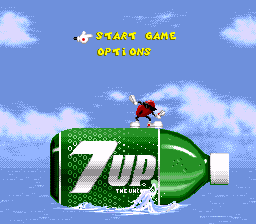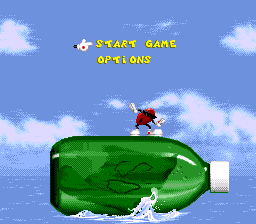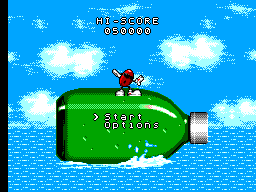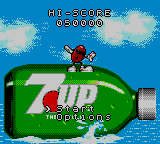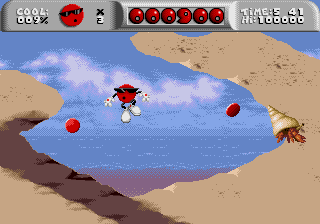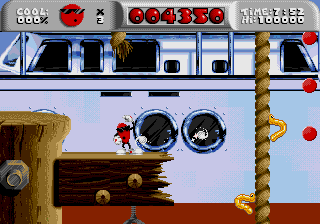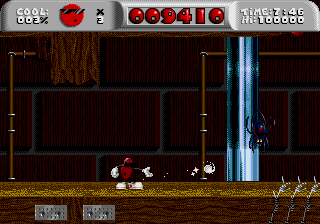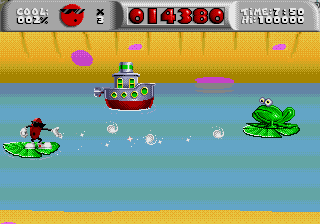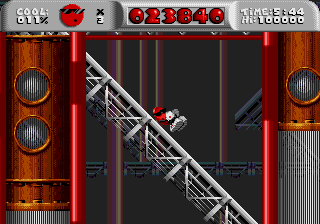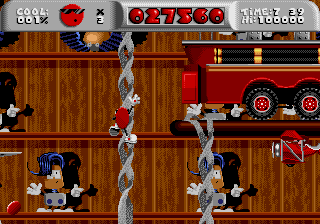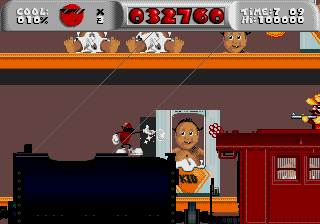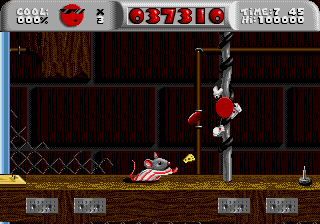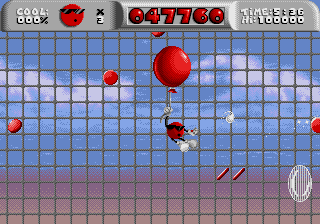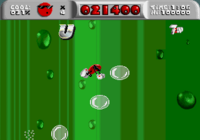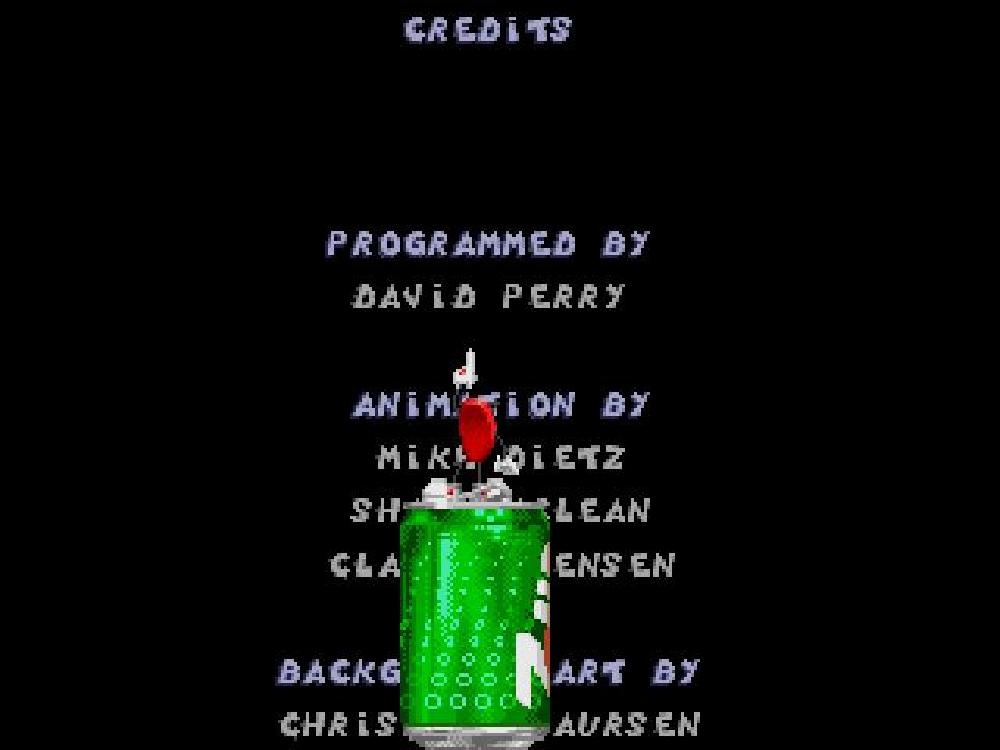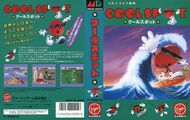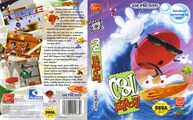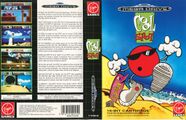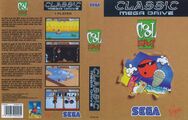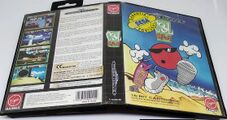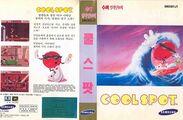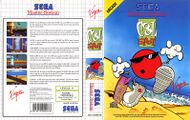Cool Spot
From Sega Retro
| Cool Spot | ||||||||||||||||||||||||||||||||||||||||||||||||||||||||||||||||||||||||||||||||||||||||||
|---|---|---|---|---|---|---|---|---|---|---|---|---|---|---|---|---|---|---|---|---|---|---|---|---|---|---|---|---|---|---|---|---|---|---|---|---|---|---|---|---|---|---|---|---|---|---|---|---|---|---|---|---|---|---|---|---|---|---|---|---|---|---|---|---|---|---|---|---|---|---|---|---|---|---|---|---|---|---|---|---|---|---|---|---|---|---|---|---|---|---|
| System(s): Sega Mega Drive, Sega Game Gear, Sega Master System | ||||||||||||||||||||||||||||||||||||||||||||||||||||||||||||||||||||||||||||||||||||||||||
| Publisher: Virgin Games Virgin Interactive Entertainment | ||||||||||||||||||||||||||||||||||||||||||||||||||||||||||||||||||||||||||||||||||||||||||
| Developer: Virgin Games Virgin Interactive Entertainment | ||||||||||||||||||||||||||||||||||||||||||||||||||||||||||||||||||||||||||||||||||||||||||
| Distributor: Sega (US) | ||||||||||||||||||||||||||||||||||||||||||||||||||||||||||||||||||||||||||||||||||||||||||
| Sound driver: GEMS | ||||||||||||||||||||||||||||||||||||||||||||||||||||||||||||||||||||||||||||||||||||||||||
| Genre: Action[1][2], Arcade[3] | ||||||||||||||||||||||||||||||||||||||||||||||||||||||||||||||||||||||||||||||||||||||||||
| Number of players: 1 | ||||||||||||||||||||||||||||||||||||||||||||||||||||||||||||||||||||||||||||||||||||||||||
| ||||||||||||||||||||||||||||||||||||||||||||||||||||||||||||||||||||||||||||||||||||||||||
| ||||||||||||||||||||||||||||||||||||||||||||||||||||||||||||||||||||||||||||||||||||||||||
Cool Spot (クールスポット) is a 1993 platform video game developed and published by Virgin Interactive starring the then-mascot of 7 Up, the 7 Up spot. It is a sequel to Spot: The Video Game, a puzzle game similar to Ataxx initially released on the Commodore Amiga and Atari ST.
Cool Spot was developed with the Sega Mega Drive in mind, and due to its success was ported to other platforms, including the Amiga, DOS computers, Game Boy, Sega Game Gear, Sega Master System and Super NES. During development, it was referred to as Spot: The Quest For Cool.
The game was followed by the isometric platformer Spot Goes to Hollywood in 1995.
Contents
Gameplay
The game is a platformer played as 7 Up mascot Spot. The goal is to collect "cool points," red spots scattered throughout each level. Once enough have been found, the player must find the fellow Spot, who is captured in a cage, and release him by shooting the lock. The levels are filled with enemies and contain platforming elements such as balloons that Spot can hang from and hazards such as spikes or water traps that Spot must avoid. Spot is moved with ![]() and
and ![]() . He jumps with
. He jumps with ![]() and jumps higher with
and jumps higher with ![]() +
+![]() . Enemies can be defeated by firing Spot's fizz-like projectile with
. Enemies can be defeated by firing Spot's fizz-like projectile with ![]() . The projectile can be directed with the D-pad (including diagonals) and is also used to open the cages.
. The projectile can be directed with the D-pad (including diagonals) and is also used to open the cages.
Spot's health is indicated by a picture of himself in the status bar, which starts to peel off as he takes damage from enemies or hazards. Additionally, each level is timed. Spot loses a life if he runs out of health or runs out of time. There are items throughout the levels that replenish health and time. If Spot runs out of lives, the game ends, but the player can earn continues in the bonus levels. The player has an opportunity to earn an extra life at the end of each level based on the amount of time left.
There are three difficulty levels (Easy, Normal, and Hard), which are selectable in the options before starting the game. The difficulty level affects the number of enemies, the placement of the cage, and the number of cool points that must be collected to complete the level or access the bonus level. There are 100 total cool points in each level.
| Attribute | Easy | Normal | Hard |
|---|---|---|---|
| Starting lives | 4 | 3 | 2 |
| Cool points to complete level | 30 | 60 | 90 |
| Cool points for bonus level | 75 | 85 | 95 |
The 8-bit versions play identically. In the Master System version, ![]() jumps and
jumps and ![]() shoots. In the Game Gear version,
shoots. In the Game Gear version, ![]() jumps and
jumps and ![]() shoots.
shoots.
Items
| Cool Point | |
|---|---|
| Collect to complete the stage. Adds 1 to the cool percentage. | |
| 7 Up | |
| Collect to complete the stage. Adds 7 to the cool percentage. | |
| Glass | |
| Replenishes part of Spot's life. | |
| Timer | |
| Adds 30 seconds to the timer. | |
| 1 Up | |
| Gives the player an extra life. | |
| Checkpoint | |
| Checkpoint where Spot is revived after losing a life. |
Levels
| Shell Shock | |
|---|---|
| Pier Pressure | |
| Off the Wall | |
| Wading Around | |
| Toying Around | |
| Not present in the 8-bit versions. | |
| Radical Rails | |
| Wound Up | |
| Not present in the 8-bit versions. | |
| Loco Motive | |
| Not present in the 8-bit versions. | |
| Back to the Wall | |
| Dock and Roll | |
| Surf Patrol | |
Bonus Level
Bonus levels are unlocked by collecting a certain number of cool points, which varies depending on the difficulty level, on top of the number needed for level completion. The level takes place inside a 7 Up bottle. Spot can use bubbles to explore the bottle and find one of the letters in "UNCOLA," which gives the player a continue. Bonus levels, like regular levels, also contain 100 cool points, and the player earns an extra life by collecting all of them.
Versions
Cool Spot was developed with the Sega Mega Drive in mind before being ported to other platforms.
As Spot stood as a mascot for 7 Up, Cool Spot was originally intended to help promote the 7 Up soft drink, however curiously most 7 Up branding was removed following its initial North American release. The PAL and subsequent Super NES versions still credit the 7 Up company for the license to use the Spot character, but all branded bottles are replaced with unlabeled alternatives (such as the bottle Spot rides in the introduction).
The PAL Mega Drive versions were partially optimised to have correct music speed, but the gameplay is slower than in the NTSC version. As a result, forcing the game to run at 60Hz causes the music to play too fast.
Most conversions of the game retain the same core gameplay as seen in the Mega Drive version, however in the case of weaker systems such as the Master System and Game Gear, graphics and audio are cut back.
The Super NES version, released several months after the Mega Drive original, offers more colourful (and in some cases, more "animated") graphics, but at the expense of screen resolution. In this case, the assets, designed for the Mega Drive's 320x224 display, were not re-worked for the 256x224 resolution of the Super NES, and subsequently appear wider than originally intended (alongside a reduced field of view). However, the Super NES version is able to make use of semi-transparent sprites which were not achievable on standard Mega Drive hardware.
Production credits
Mega Drive version
Note: Michael Merren is only credited as producer in the PAL version.
- Programmed by: David Perry
- Animation by: Mike Dietz, Shawn McLean, Clark Sorensen
- Background Art by: Christian Laursen
- Music, Sound FX & Samples by: Tommy Tallarico
- Executive Game Designer: David Bishop
- Level Design: Bill 'Boy' Anderson
- Game Design: The 'Global' Team
- Additional Background Art by: Rene Boutin
- Art Supervision: Stan Gorman, Mike Dietz
- Artists: Roger Hardy, Willis Wong
- Sprite Management Engineer: Tim Williams, Doug Cope
- Samples by: Steven S. Henifin
- Quality Assurance Manager: Michael D. Gater
- Testing and Quality Assurance: Noah Tool, Justin Norr, Danny Lewis, Mike Glosecki, Bijan Shaheer, Adam Ryan, Scott Duckett
- Producer: Cathie A. Bartz-Todd, Michael Merren
- Executive Producers: Neil Young, Dr. Stephen H. Clarke-Willson
Master System version
- Origional Game Designed by: [sic] Virgin Games Inc
- Programmed by: David Leitch
- Graphics by: Doug Townsley
- Music & SFX by: Krisalis
- Produced by: John Roberts
- Testing by: James Dillon, Graham Tizzard
Game Gear version
- Origional Game Designed by: [sic] Virgin Games Inc
- Programmed by: David Leitch
- Graphics by: Doug Townsley
- Music & SFX by: Krisalis
- Produced by: John Roberts
- Testing by: J. Dillon, G. Tizzard
Magazine articles
- Main article: Cool Spot/Magazine articles.
Promotional material
- Main article: Cool Spot/Promotional material.
Physical scans
Mega Drive version
| 85 | |
|---|---|
| Based on 46 reviews | |
| Mega Drive, EU (Classic Mega Drive) |
|---|
| Mega Drive, SE (Rental) |
|---|
|
Master System version
| Sega Retro Average | |||||||||||||||||||||||||||||||||||||||||||||||||||||||||||
|---|---|---|---|---|---|---|---|---|---|---|---|---|---|---|---|---|---|---|---|---|---|---|---|---|---|---|---|---|---|---|---|---|---|---|---|---|---|---|---|---|---|---|---|---|---|---|---|---|---|---|---|---|---|---|---|---|---|---|---|
|
| 85 | |
|---|---|
| Based on 11 reviews | |
Game Gear version
| Sega Retro Average | ||||||||||||||||||||||||||||||||||||||||||||||||||||||||||||||||||||||||||||||||||||
|---|---|---|---|---|---|---|---|---|---|---|---|---|---|---|---|---|---|---|---|---|---|---|---|---|---|---|---|---|---|---|---|---|---|---|---|---|---|---|---|---|---|---|---|---|---|---|---|---|---|---|---|---|---|---|---|---|---|---|---|---|---|---|---|---|---|---|---|---|---|---|---|---|---|---|---|---|---|---|---|---|---|---|---|---|
|
| 85 | |
|---|---|
| Based on 16 reviews | |
Technical information
ROM dump status
| System | Hash | Size | Build Date | Source | Comments | |||||||||
|---|---|---|---|---|---|---|---|---|---|---|---|---|---|---|
| ✔ |
|
1MB | 1993-01-25[86] | Cartridge (US) | ||||||||||
| ✔ |
|
1MB | 1993-01-25[87] | Cartridge (EU) | ||||||||||
| ✔ |
|
1MB | 1993-11-16[88] | Cartridge (JP/KR) | ||||||||||
| ? |
|
1MB | 1992-12-22[89] | Page | ||||||||||
| ? |
|
256kB | Cartridge (EU) | |||||||||||
| ? |
|
256kB | Cartridge (EU) | |||||||||||
| ? |
|
256kB | Cartridge (US) |
References
- ↑ File:CoolSpot GG EU Box Back.jpg
- ↑ 2.0 2.1 https://sega.jp/history/hard/megadrive/software_l.html (Wayback Machine: 2020-07-02 23:21)
- ↑ File:Cool Spot SMS EU Box.jpg
- ↑ Beep! MegaDrive, "June 1993" (JP; 1993-05-08), page 13
- ↑ 5.0 5.1 GamePro, "April 1993" (US; 1993-xx-xx), page 47
- ↑ 6.0 6.1 6.2 Mega, "June 1993" (UK; 1993-05-20), page 43
- ↑ 7.0 7.1 Sega Zone, "May 1993" (UK; 1993-04-08), page 22
- ↑ Sega Force, "June 1993" (UK; 1993-05-06), page 61
- ↑ 9.0 9.1 Sega Magazin, "September/Oktober 1993" (DE; 1993-09-01), page 56
- ↑ Jogos Vídeo, "Dezembro de 1993; Ano 1, Nº 2'"`UNIQ--ref-0000000C-QINU`"'" (PT; 1993-12-xx), page 43
- ↑ 11.0 11.1 11.2 Mean Machines Sega, "December 1993" (UK; 1993-10-xx), page 100
- ↑ Sega Force Mega, "January 1994" (UK; 1993-12-16), page 65
- ↑ GamePro, "October 1993" (US; 1993-xx-xx), page 158
- ↑ Sega Force Mega, "January 1994" (UK; 1993-12-16), page 73
- ↑ File:CoolSpot MD US credits.pdf
- ↑ File:CoolSpot SMS credits.png
- ↑ File:CoolSpot GG credits.png
- ↑ 1700 igr dlya Sega, "" (RU; 2001-xx-xx), page 51
- ↑ Æskan, "" (IS; 1993-06-01), page 1
- ↑ Alaab Alcomputtar, "" (SA; 1995-06-xx), page 80
- ↑ Aktueller Software Markt, "August 1993" (DE; 1993-07-12), page 52
- ↑ Beep! MegaDrive, "March 1994" (JP; 1994-02-08), page 19
- ↑ Consoles +, "Juin 1993" (FR; 1993-0x-xx), page 106
- ↑ Cool Gamer, "9" (RU; 2002-10-13), page 55
- ↑ Electronic Games (1992-1995), "June 1993" (US; 1993-05-11), page 52
- ↑ Electronic Gaming Monthly, "May 1993" (US; 1993-xx-xx), page 28
- ↑ Entsiklopediya luchshikh igr Sega. Vypusk 1, "" (RU; 1999-xx-xx), page 302
- ↑ Entsiklopediya luchshikh igr Sega. Vypusk 4, "" (RU; 2001-xx-xx), page 92
- ↑ Mean Machines: The Essential Sega Guide, "" (UK; 1993-11-18), page 33
- ↑ Famitsu, "1994-02-25" (JP; 1994-02-10), page 1
- ↑ Game Power, "Maggio 1993" (IT; 1993-0x-xx), page 35
- ↑ Game Power, "Gennaio 1994" (IT; 199x-xx-xx), page 86
- ↑ GamePro, "April 1993" (US; 1993-xx-xx), page 46
- ↑ GamesMaster, "May 1993" (UK; 1993-04-19), page 60
- ↑ Game Informer, "May/June 1993" (US; 1993-0x-xx), page 52
- ↑ Hippon Super, "February 1994" (JP; 1994-01-06), page 43
- ↑ Joypad, "Juin 1993" (FR; 1993-0x-xx), page 72
- ↑ Sega Mega Drive Advanced Gaming, "June 1993" (UK; 1993-04-29), page 18
- ↑ Mega, "June 1993" (UK; 1993-05-20), page 42
- ↑ Mega Action, "December 1993" (UK; 1993-11-04), page 80
- ↑ Mega Force, "Juin 1993" (FR; 1993-0x-xx), page 84
- ↑ Mega Fun, "07/93" (DE; 1993-06-23), page 82
- ↑ Mega Play, "June 1993" (US; 1993-0x-xx), page 64
- ↑ MegaTech, "May 1993" (UK; 1993-04-23), page 68
- ↑ Mean Machines Sega, "May 1993" (UK; 1993-04-24), page 52
- ↑ Player One, "Juin/Juillet 1993" (FR; 1993-06-10), page 62
- ↑ Power Up!, "Saturday, June 26, 1993" (UK; 1993-06-26), page 1
- ↑ Power Play, "8/93" (DE; 1993-07-14), page 106
- ↑ ProGames, "Julho 1993" (BR; 1993-0x-xx), page 28
- ↑ Power Unlimited, "Nummer 2, September 1993" (NL; 1993-08-19), page 29
- ↑ Score, "Únor 1994" (CZ; 1994-02-01), page 44
- ↑ Sega Power, "June 1993" (UK; 1993-05-06), page 60
- ↑ Sega Pro, "May 1993" (UK; 1993-04-08), page 24
- ↑ Sega Zone, "June 1993" (UK; 1993-05-xx), page 32
- ↑ Sega Force, "5/93" (SE; 1993-08-26), page 6
- ↑ Sega Force, "June 1993" (UK; 1993-05-06), page 58
- ↑ Sega Mega Drive Review, "1" (RU; 1995-04-03), page 35
- ↑ Sega Saturn Magazine, "September 1995" (JP; 1995-08-08), page 87
- ↑ Supergame, "Junho 1993" (BR; 1993-06-xx), page 16
- ↑ Supersonic, "Juillet/Août 1993" (FR; 1993-xx-xx), page 34
- ↑ Tricks 16 bit, "Tricks Sega Gold 800 igr" (RU; 1998-03-20), page 46
- ↑ Video Games, "7/93" (DE; 1993-06-30), page 94
- ↑ Joypad, "Décembre 1993" (FR; 1993-1x-xx), page 162
- ↑ Mega Force, "Décembre 1993" (FR; 1993-12-10), page 134
- ↑ 65.0 65.1 Mega Fun, "12/93" (DE; 1993-11-24), page 112
- ↑ Player One, "Décembre 1993" (FR; 1993-1x-xx), page 154
- ↑ 67.0 67.1 Sega Magazin, "November/Dezember 1993" (DE; 1993-11-03), page 20
- ↑ 68.0 68.1 Sega Power, "December 1993" (UK; 1993-11-xx), page 52
- ↑ Sega Pro, "Xmas Special 1993" (UK; 1993-12-02), page 55
- ↑ Sega Force, "8/93" (SE; 1993-12-09), page 24
- ↑ Sega Master Force, "December 1993" (UK; 1993-11-11), page 64
- ↑ Todo Sega, "Octubre 1993" (ES; 1993-xx-xx), page 44
- ↑ Digitiser (UK) (1994-01-04)
- ↑ Electronic Gaming Monthly, "December 1993" (US; 1993-xx-xx), page 55
- ↑ GamePro, "November 1993" (US; 1993-xx-xx), page 192
- ↑ Joypad, "Décembre 1993" (FR; 1993-1x-xx), page 153
- ↑ Joypad, "3/1994" (HU; 1994-xx-xx), page 23
- ↑ Megablast, "1/94" (DE; 1993-12-29), page 83
- ↑ Megazone, "October 1993" (AU; 1993-xx-xx), page 28
- ↑ Sega News, "Leden 1997" (CZ; 1997-xx-xx), page 36
- ↑ Sega Pro, "Xmas Special 1993" (UK; 1993-12-02), page 60
- ↑ Sega Zone, "December 1993" (UK; 1993-11-25), page 35
- ↑ Sega Force, "8/93" (SE; 1993-12-09), page 27
- ↑ Sega Master Force, "December 1993" (UK; 1993-11-11), page 73
- ↑ Todo Sega, "Noviembre 1993" (ES; 1993-1x-xx), page 64
- ↑ File:CoolSpot MD DebugMenu 2.png
- ↑ File:CoolSpot MD EU DebugMenu.png
- ↑ File:CoolSpot MD JP DebugMenu.png
- ↑ File:CoolSpot1992-12-22 MD DebugMenu.png
| Cool Spot | |
|---|---|
|
Main page | Comparisons | Maps | Hidden content | Bugs | Magazine articles | Video coverage | Reception | Promotional material | Region coding | Technical information | Bootlegs
Prototypes: 1992-12-22
| |
- 1 player games
- JP Mega Drive games
- All JP games
- US Mega Drive games
- All US games
- EU Mega Drive games
- All EU games
- Classic Mega Drive games
- DE Mega Drive games
- All DE games
- PT Mega Drive games
- All PT games
- UK Mega Drive games
- All UK games
- SE Mega Drive games
- All SE games
- AU Mega Drive games
- All AU games
- KR Mega Drive games
- All KR games
- Mega Drive games
- 1993 Mega Drive games
- All 1993 games
- Mega Drive action games
- All action games
- EU Master System games
- PT Master System games
- UK Master System games
- AU Master System games
- Master System games
- 1993 Master System games
- Master System action games
- US Game Gear games
- EU Game Gear games
- UK Game Gear games
- Game Gear games
- 1993 Game Gear games
- Game Gear action games
- Old content rating field
- All games
- Credits without reference
- Old-style rating (pu)
- Update ratings template
- 0 old ratings
- Old-style rating (joypad)
- 1 old ratings
- Games with known prototypes
- Old technical information
- Cool Spot
